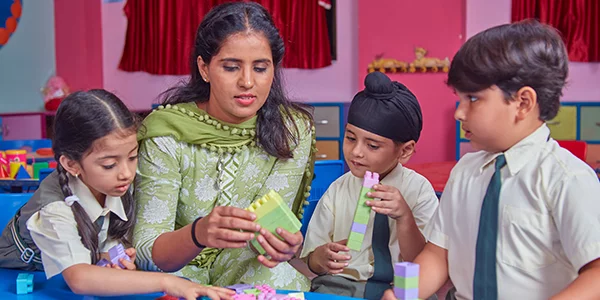How is NEP 2020 Rejuvenating Pre-primary Education in India?

How is NEP 2020 Rejuvenating Pre-primary Education in India?
Last Updated On: 15/05/2025
Paridhi Sharma
School Owner

“Technology can bring a classroom to life and help students connect with the world.” – Sal Khan
National Education Policy 2020: Transforming Education with Innovative Features
The National Education Policy 2020 has various key features that aim to create an inclusive, learner-centred, and flexible education system that can brace students for the challenges of the 21st century. Here are some of the most significant features of The National Education Policy 2020:
- The policy focuses on the need for a multidisciplinary approach to education, which motivates students to discover diverse subjects and build a broad range of skills.
- The policy stresses the significance of holistic development, which incorporates cognitive, emotional, social, and physical development, along with ethics and values.
- The NEP 2020 aims to provide fair access to education for all students, regardless of their background, socioeconomic status, or gender.
- The policy recognizes the importance of technology in education and seeks to integrate it into the curriculum.
- NEP 2020 prioritises early childhood education, providing quality learning to children aged 3-6.
- The New Education Policy 2020 emphasises the importance of vocational education and skill development, which can allow children to acquire the skills vital to enter the workforce.
In this article

The Impact of the New Education Policy on Early Childhood Education (pre-primary)

How is LEAD aligned with the National Education Policy 2020?
The Impact of the New Education Policy on Early Childhood Education (pre-primary)
The New Education Policy for pre-primary has various key impacts on education in India. The policy has a significant impact on pre-primary education in India by encouraging equity, quality education, innovation, and inclusivity in this crucial stage of a child’s development. Here are some of the most significant impact of the New Education Policy for pre-primary:
- Emphasis on holistic development
The policy has a significant focus on holistic development, which incorporates cognitive, emotional, social, and physical development, along with ethics and values. This assists in the overall development of children and prepares them for lifelong learning.
- Strong foundation in play-based and activity-based learning
The policy proposes a firm foundation in play-based and activity-based learning for pre-primary education, which can transform learning into a more enjoyable, engaging, and effective experience.
- Equitable access to education
The New Education policy for Early Childhood Education aims to provide equal access to pre-primary education for all children. This helps minimise the disparities in education and provides a level playing field for all children.
- Flexibility and inclusivity
The policy put forward a flexible and inclusive framework for pre-primary education, keeping in mind the diverse requirements and learning styles of children. This allows teachers to adopt innovative and child-centred approaches to teaching.
- Integration of technology
The policy emphasises the significance of integrating technology in pre-primary education, which makes learning more engaging, interactive, and effective.
Teacher training and support
The NEP 2020 recognizes the significance of teacher training and support for pre-primary education, which helps teachers develop the skills vital to impart quality education to young children.
Never miss a story
Stay updated with the latest news and articles related to school education
GIVE YOUR SCHOOL THE LEAD ADVANTAGE
How is LEAD aligned with the National Education Policy 2020?
LEAD School Edtech solutions are internationally relevant and curated to aid students. LEAD keeps itself updated with new changes in the education industry just like how it imparts solutions and services according to NEP 2020 impact:
- International Standard Curriculum: The curriculum of LEAD is benchmarked with Singapore and US education systems. The curriculum is more integrated, application-based, student-focused, and multi-modal to assist children in becoming more confident and future-ready.
- Smart Classrooms: These classrooms pave the way for interactive learning, which engages children’s visual and auditory senses. Unlike traditional classrooms, smart classrooms help enhance conceptual understanding as they build students’ curiosity and make learning more interesting.
- Super Teachers: LEAD teachers are certified and are equipped with a teacher tablet incorporated with lesson plans, audiovisual resources, and training materials.
- Coding and Computational Skills: It allows each student to use several software, think logically and computationally, and develop applications, games and websites.
LEAD, India’s most trusted and reputed brand in the education sector, understands the significance and impact of the new National Education Policy 2020.
Conclusion
The National Education Policy 2020 for pre-primary education is a progressive step towards building a dynamic and modern education system in India. The future of education in India seems to be promising with this visionary policy in place. Moreover, if you want to adapt to the changes brought about by NEP 2020’s prominent characteristics, LEAD’s modernised and integrated learning management solution can help you!
Article Summary
Article Summary
- NEP 2020 focuses on practical learning instead of rote learning.
- The New Education Policy ensures that children receive quality education regardless of any differences.
- NEP 2020 enables teachers to utilise a range of learning techniques and experiments.
- National Education Policy 2020 prioritises the comprehensive transformation of the education system in India.
